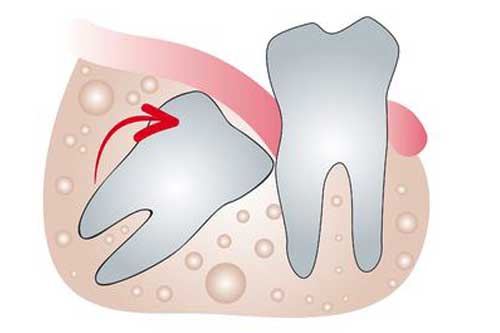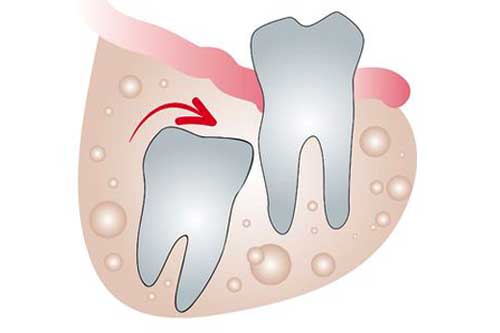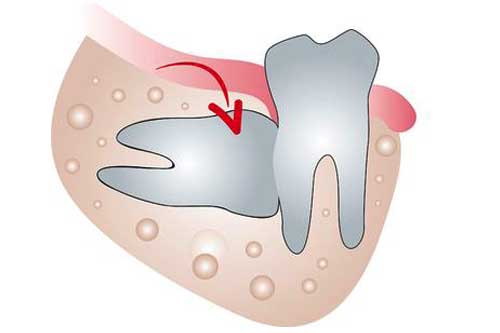Wisdom Teeth Removal (Extraction)
Impacted Teeth
Are you in need of wisdom teeth removal (also known as wisdom teeth extraction)? Read on to learn about the procedure, recovery, and FAQs to put your mind at ease.

Are you in need of wisdom teeth removal?
Wisdom teeth are the third molars located at the back of the mouth that usually emerge during early adulthood, between the ages of 17 and 25. While some people have enough room in their mouths to accommodate these teeth, others may experience overcrowding or impaction, leading to pain, infection, and other dental problems. Wisdom teeth removal, also known as wisdom teeth extraction, is a common dental procedure used to address these issues.
Preparation for Wisdom Teeth Removal (Extraction)
There are several signs that you may need root canal treatment. Common symptoms of an infected tooth may include severe pain, sensitivity to hot or cold, swelling, and tenderness around the affected tooth.

Grow at an angle towards the second molar

Grow at an angle towards the back of the mouth

Sometimes they grow at a right angle to the other teeth
Before undergoing wisdom teeth removal, your dentist or oral surgeon will conduct a thorough examination of your teeth and take X-rays to determine the positioning of your wisdom teeth. Based on the results, they will discuss the best course of action, which may involve local anesthesia or sedation to ensure your comfort during the procedure.
Some things to keep in mind to prepare for wisdom teeth removal:
Root canal treatment in Rochedale has several benefits, including:
- Inform your dentist or oral surgeon of any medications you are taking or medical conditions you have.
- Arrange for someone to drive you home after the procedure, as you may still be under the effects of anesthesia.
- Plan to take a few days off work or school to allow for proper rest and recovery.
- Avoid smoking or drinking alcohol for at least 24 hours before the procedure, as these can interfere with the healing process.
- Follow any specific instructions provided by your dentist or oral surgeon regarding eating and drinking before the procedure.
The Wisdom Teeth Removal (Extraction) Procedure
Wisdom teeth removal typically takes around 30 to 60 minutes, depending on the complexity of the procedure. Here’s what you can expect during the procedure:
- Your dentist or oral surgeon will administer local anesthesia or sedation to numb the area and minimize any discomfort.
- They will then make an incision in the gum tissue and remove any bone blocking access to the tooth.
- The tooth may be divided into smaller pieces to facilitate its removal.
- Finally, any remaining debris will be cleaned out and the incision will be closed with stitches
After the procedure, you will be monitored for a short period of time to ensure that you are recovering properly. Once you are cleared to leave, you will receive specific instructions for postoperative care, including pain management, oral hygiene, and diet restrictions.
Recovery from Wisdom Teeth Removal (Extraction)
After the root canal treatment, the tooth may be sensitive for a few days, but this can be managed with over-the-counter. Recovery from wisdom teeth removal varies from person to person, but most people can expect to experience some discomfort and swelling for the first few days after the procedure. Here are some tips for a smooth recovery:
- Apply ice packs to the affected area to reduce swelling and discomfort.
- Take over-the-counter pain medication as prescribed by your dentist or oral surgeon.
- Avoid brushing or flossing the affected area for the first 24 hours after the procedure.
- Stick to soft foods and liquids for the first few days, gradually reintroducing solid foods as you feel comfortable.
- Avoid using straws or smoking, as the suction can dislodge the blood clot and delay healing.
It is also important to attend any follow-up appointments with your dentist or oral surgeon to monitor your progress and ensure proper healing.
Conclusion
Wisdom teeth removal may seem daunting, but it is a routine procedure that can alleviate pain and prevent future dental problems. By properly preparing for the procedure, following postoperative care instructions, and attending any follow-up appointments, you can ensure a smooth recovery and optimal oral health. If you are experiencing pain or discomfort related to your wisdom teeth, don’t hesitate to talk to your dentist or oral surgeon about whether wisdom teeth removal is right for you.
Frequently Asked Questions - FAQ
While you may experience some discomfort during the procedure and in the days following, your dentist or oral surgeon will take steps to ensure your comfort,
Recovery time can vary depending on the individual, but most people can expect to resume their normal activities within a week or two. Full healing can take up to several weeks.
Like any surgical procedure, there are risks associated with wisdom teeth removal, including infection, bleeding, nerve damage, and dry socket. However, these risks are rare and can be minimized by following proper postoperative care instructions.
Not necessarily. Some people are able to keep their wisdom teeth if they are not causing any issues. However, your dentist or oral surgeon may recommend removal if they are at risk of causing future problems or if they are impacting your other teeth.
No, you should arrange for someone to drive you home after the procedure, as the effects of anesthesia can impair your driving ability.
The cost of wisdom teeth removal can vary depending on a number of factors, including the complexity of the procedure and whether or not sedation is required. It is important to discuss the costs with your dentist or oral surgeon beforehand and determine whether or not your insurance will cover the procedure.




